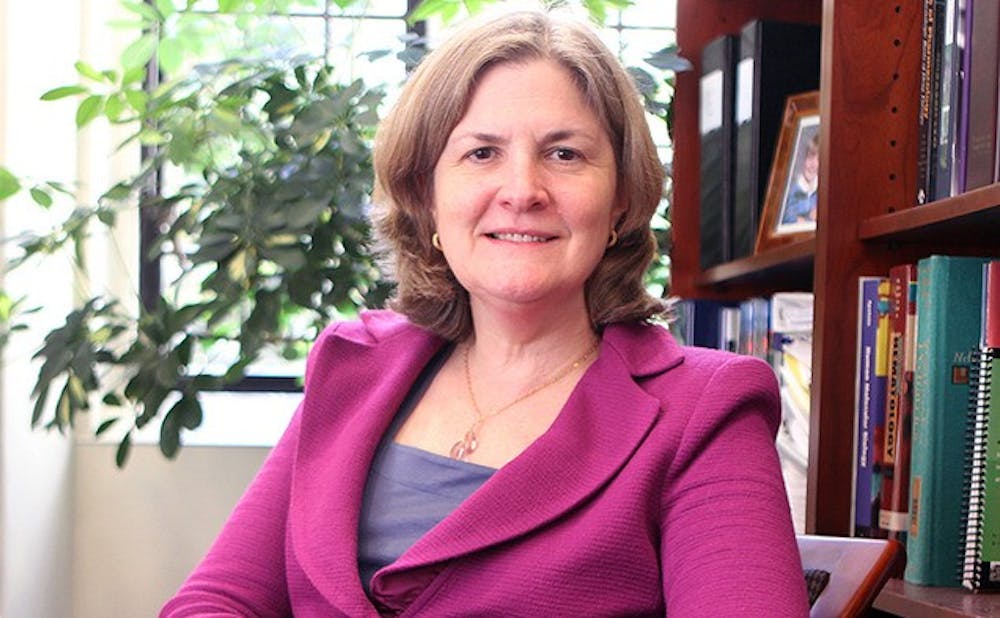Dr. Nancy Andrews, dean of the School of Medicine and vice chancellor of academic affairs, has been awarded national recognition for outstanding achievement and contributions to research. Andrews was elected in April to the National Academy of Sciences—a nonprofit advisory organization to the president and Congress consisting of 84 of the country’s most prominent scientists and researchers. Members of the NAS nominate other scientists annually based on their original research and contributions to the scientific community. The Chronicle's Amrith Ramkumar spoke with Andrews via email about the NAS recognition, her own research on iron homeostasis using mouse models and how the School of Medicine has changed throughout the past year:
The Chronicle: Could you describe being elected to the National Academy of Sciences and what it means to you given that you have to be recognized by your peers for outstanding contributions to research?
Nancy Andrews: Quite a few NAS members called me as the election results were announced at the annual meeting to let me know that I’d been elected. It means a lot to me—it’s a great honor. I have many good friends in the NAS, and I’m both grateful to them for electing me and looking forward to seeing them more often.
TC: Can you explain what you will have to do as a member of the NAS?
NA: Membership in the NAS is primarily honorific. I will help elect new members and act as an editor for papers submitted to the NAS journal (Proceedings of the National Academy of Sciences) when they are in or near my field. I may also serve on National Academy committees if my expertise is useful.
TC: Related to your election to the NAS, can you describe any recent progress with your research or other relevant information?
NA: I think I was elected for my role in working out how mice and humans handle iron, an essential nutrient. My lab contributed by identifying a number of proteins important in iron handling, by working out the molecular basis of several iron-related human diseases and by using mouse genetics in novel ways to understand iron physiology. It was particularly gratifying that we figured out the causes, previously unknown, of iron disorders that affected several of my own patients.
TC: Switching gears a bit to talk about the School of Medicine more broadly…there have obviously been great successes recently with research, especially with the polio virus being used for cancer treatment. Could you update us on the largest projects like that one and look ahead to other projects you're looking forward to in the upcoming year?
NA: With a faculty of about 2,000 people, most of whom are involved in research (to varying extents), there are exciting research successes every day. Some of the largest projects include the effort to develop an HIV vaccine, led by Dr. Bart Haynes; our Clinical and Translational Science Award, led by Dr. Ebony Boulware; and the multi-site clinical trials overseen by Dr. Eric Peterson as director of the Duke Clinical Research Institute. Also this year, Duke investigators were among the first funded for President Obama’s BRAIN Initiative, and the first surgical implant of bionic eye in North Carolina was performed at Duke.
But those are just a small sampling of particularly big projects—our faculty makes high impact, important research findings pretty much every day. We have more than $700 million in external grant support for research. That’s a lot of research firepower.
TC: Dr. [A. Eugene] Washington took over as the chancellor [of Duke University Health System] in April—what have you taken away from your interactions with him and what challenges do you think he will face early on?
NA: I think Dr. Washington will bring important expertise in health policy that complements what we already had. He is going to be a wonderful external face for Duke Medicine, with the community, potential donors and others. In my view his biggest challenge will be helping to shape the business strategy of the health system. He has experience with this from his previous work at [the University of California at Los Angeles].
TC: We're obviously in a period of enormous change for the University. How has the School of Medicine changed along with it since you have been here and what are some of the other changes you foresee in the future?
NA: The most obvious changes are in our physical plant—the School of Medicine built the Trent Semans Center for Health Education several years back, and we are just about to open a new eye center (the Hudson Building). But we have also launched many new programs (e.g., the Primary Care Leadership Track for medical students interested in community health; the Master of Biomedical Sciences program for college graduates interested in health careers; the Masters and Ph.D. programs in Biostatistics; the Master of Management in Clinical Informatics; the Office for Biomedical Graduate Diversity/BioCORE, and others).
And we’ve created a number of new research initiatives including the Center for Genomics of Microbial Systems, the Center for Human Disease Modeling, the Duke Molecular Physiology Institute and others. We’ve enriched our faculty through our interdisciplinary Partnership Hires program. We’ve raised almost $900 million to support our various activities. We remained stable and vibrant through the worst financial time the School of Medicine has ever experienced. We’ve added four new departments (going from 18 to 22 total), and I’ve appointed 18 new department chairs. We’ve made diversity and inclusion a major priority, and we’re starting to see its benefits. We’re initiating a new, more formal relationship with the Pratt School of Engineering to enhance research and education relationships. These are just a few highlights—we’ve been very busy!
Get The Chronicle straight to your inbox
Signup for our weekly newsletter. Cancel at any time.

